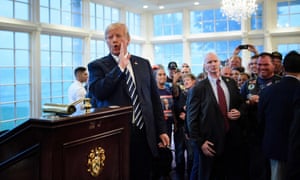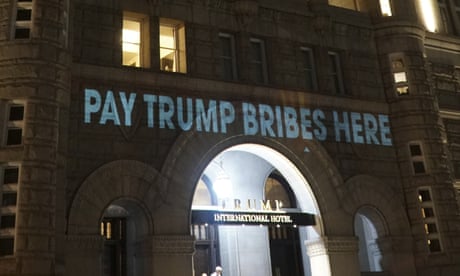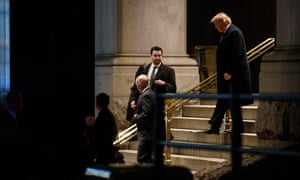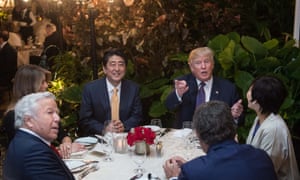How Trump's businesses are booming with lobbyists, donors and governments
The president has refused to sever ties with his hotels, golf courses and condos – raising conflict of interest and corruption concerns
Peter Stone in Washington
Fri 19 Jul 2019 00.00 EDTLast modified on Fri 19 Jul 2019 00.06 EDT

Donald Trump meets with supporters during a Bikers for Trump event at the Trump National Golf club in Bedminster, New Jersey, on 11 August 2018. Photograph: Brendan Smialowski/AFP/Getty Images
From Florida to New York to Scotland and many other places, Donald Trump’s business empire has attracted a growing clientele of lobbyists, foreign governments, big donors and other Trump allies looking to curry favor, and helping generate hundreds of millions of dollars for his golf course resorts, condos and hotels.
While much attention has focused on Trump’s Washington DC hotel as a honeypot for those seeking to influence the administration, Trump’s broader property empire across the US – and overseas – also concerns critics who say the president is using his office for financial benefit.

During his first two full years as president, Trump’s revenues from his far-flung real estate business, which his two eldest sons are running while he is president, totaled at least $886m, according to Trump’s annual financial disclosures.
Trump’s controversial decision not to completely sever ties to his real estate interests in the US and overseas, or put his assets in a blind trust to limit conflicts of interest, has sparked strong condemnation from ethics watchdog groups, political analysts and congressional Democrats.
The financial web of ties between the president and his various properties is underscored by all manner of fundraising bashes, lobbyist meetings and foreign stays at Trump’s properties, spawning legal and ethics complaints.
“Whether accepting money from political candidates, lobbyists or foreign governments, the president’s businesses seem all too willing to promote the message that the presidency is for sale,” Congressman Elijah Cummings, the chairman of the House oversight and reform committee, said in a statement.
According to his annual financial disclosures, Trump’s top revenue-producing properties have done handsomely by hosting fundraisers, lobbyist meetings and foreign delegations. They include:
• The Trump National Doral Golf Club in Miami, a favorite hangout for lobbyists and donors with ties to Trump, is a leading revenue source, yielding close to $151m in his first two years as president. Notably, the Doral club hosted annual meetings in 2018 and 2019 for a business group of payday lenders whose exorbitant interest rates sparked a regulatory crackdown by the Obama administration, but have been cheered by recent Trump administration rollbacks.
• Trump’s self styled “summer White House” in Bedminster, New Jersey, had revenues of $30.8m in the same two-year period. On 19 July, Trump’s campaign and the Republican National Committee are slated to host a big fundraiser in Bedminster where donors who pony up $100,000 can get their picture taken with Trump, enjoy a roundtable chat with him and other perks.
• Mar-a-Lago, the swanky Palm Beach club where Trump doubled the annual membership fee to $200,000 when he became president, pulled in revenues totaling $48m in the two-year period. As ProPublica first revealed, a trio of wealthy Mar-a-Lago members, who are friends of Trump, played a big role in shaping policy at the Department of Veterans Affairs, spurring a House panel to look into allegations of “improper influence”.
• Trump’s Turnberry golf resort in Scotland, which Trump has visited and promoted in tweets while in office as “incredible”, notched revenues of $43.8m in 2017 and 2018.
Robert Maguire, the research director of the nonpartisan ethics watchdog Crew, said the web of influence peddling at Trump’s properties poses “…unprecedented conflicts of interest. President Trump’s continued financial ties to his businesses including his hotel have been received by his administration and political allies not with scorn, but enthusiastic support.”
FacebookTwitterPinterest
Donald Trump exits the Trump International Hotel after attending the 2019 Maga Leadership Summit in Washington on 28 January 2019. Photograph: Shawn Thew/EPA
Little wonder Trump’s financial ties to his businesses have prompted congressional scrutiny by the House oversight committee and other panels, plus a lawsuit by more than 200 Democrats alleging the foreign business at his properties violate an anti-corruption clause in the constitution designed to curb improper foreign influence on federal officials.
Data compiled by Crew sheds further light on the web of ties between the president and his businesses.
Recent Crew data found that through mid-2019, Trump has made at least 345 visits to properties that he continues to profit from while in office. Further, Trump personally mentioned or referred to his company at least 143 times since taking office, the Crew data also showed.
Some powerful lobbyists, such as Florida’s Brian Ballard, who is known to have good ties to Trump, have also helped boost business at Trump properties via his clients. One example: Geo Group, a private prison company that Ballard lobbies for, won a $110m contract in 2017 to build an immigration detention facility in Texas and soon after moved its annual leadership meeting to Trump’s Doral golf club.
Other Ballard clients, including Nigerian officials, have hosted meetings or stayed at the Trump hotel in DC.
Foreign government patronage of Trump properties has been especially notable, sparking separate lawsuits by some 200 Democrats in Congress, as well as attorneys general from Maryland and DC, who allege that they violate the foreign emoluments clause in the constitution. The clause bars foreign payments or gifts to federal officials without authorization by Congress.
FacebookTwitterPinterest
Donald Trump dines with the Japanese prime minister, Shinzo Abe, and their wives, along with Robert Kraft at Mar-a-Lago in 2017. Photograph: Nicholas Kamm/AFP/Getty Images
The justice department has fought the suits, arguing the clause should only apply to direct payments to the president and not foreign patronage of his properties, a position very similar to one expressed in early 2017 by Trump’s own lawyers.
NBC News recently calculated that representatives of at least 22 foreign governments – including some facing charges of corruption or human rights abuses such as Saudi Arabia, Malaysia, Turkey and the Philippines – seem to have spent funds at Trump properties while he has been president.
Foreign spending at Trump properties mainly includes meetings, overnight stays and rentals or purchases.
Trump pledged to donate foreign profits from his properties to the government while he is in office, and the Trump Organization has written checks totaling $343,000 to the treasury for 2017 and 2018. But critics have said it’s impossible to verify if these checks fully cover foreign payments to Trump properties in part because Trump – unlike other presidents – has refused to release his tax returns.
Cummings, who leads one of a few House panels that have issued subpoenas or gone to court to obtain financial information on Trump’s income sources and businesses, says more sunlight on Trump’s foreign and domestic revenues is badly needed.
“The American people deserve complete transparency over these payments and the identities of those attempting to curry favor with the administration,” Cummings said.
If you’re reading us a little…
… or you’re reading us a lot, we hope you’ll consider supporting us with a contribution, however big or small. More people are reading and supporting The Guardian’s independent, investigative journalism than ever before. And unlike many news organisations, we have chosen an approach that allows us to keep our journalism accessible to all, regardless of where they live or what they can afford. But we need your ongoing support to keep working as we do.
The Guardian will engage with the most critical issues of our time – from the escalating climate catastrophe to widespread inequality to the influence of big tech on our lives. At a time when factual information is a necessity, we believe that each of us, around the world, deserves access to accurate reporting with integrity at its heart.
Our editorial independence means we set our own agenda and voice our own opinions. Guardian journalism is free from commercial and political bias and not influenced by billionaire owners or shareholders. This means we can give a voice to those less heard, explore where others turn away, and rigorously challenge those in power.
Above is from: https://www.theguardian.com/us-news/2019/jul/19/donald-trump-businesses-hotels-conflict-of-interest



